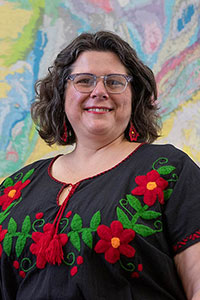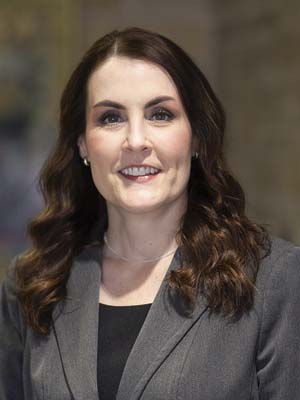- Faculty Mentoring
- Why I Mentor Essays
Why I Mentor
Why I Mentor by Melissa Lenczewski
Professor, Geomicrobiology, Organic Geochemistry, Contaminant Hydrogeology Recipient of the Exemplary Faculty Mentoring Award, 2023
 Mentoring is a personal passion that stems from my own experience of being mentored by caring and supportive people who helped me overcome challenges and achieve my goals in academia. I know how much difference a good mentor can make in the life and career of a junior colleague or a student, especially those from underrepresented or first generations groups in higher education. That is why I choose to dedicate time and energy to mentoring, hoping to create a positive impact on the growth and development of emerging scholars in my fields and across the whole of NIU.
Mentoring is a personal passion that stems from my own experience of being mentored by caring and supportive people who helped me overcome challenges and achieve my goals in academia. I know how much difference a good mentor can make in the life and career of a junior colleague or a student, especially those from underrepresented or first generations groups in higher education. That is why I choose to dedicate time and energy to mentoring, hoping to create a positive impact on the growth and development of emerging scholars in my fields and across the whole of NIU.
Mentoring pays dividends for both the mentee and the mentor. For the mentee, mentoring provides valuable advice, networking connections, and guidance about navigating the complex and competitive world of academia. Mentoring can help junior faculty and students avoid pitfalls, access more opportunities, and achieve greater productivity, self-efficacy, and satisfaction. Mentoring can also demystify the path to graduate school and a career in our field, while providing psychosocial support and encouragement. For the mentor, mentoring is a rewarding and meaningful experience that fosters personal and professional growth. Mentoring allows me to share my knowledge and experience, learn from new ideas and perspectives, and form lasting bonds with mentees. Mentoring also gives me a sense of purpose and fulfillment, as I witness the success and happiness of those I have mentored and see them play it forward as mentors themselves. Mentoring outside your discipline can be a rewarding and challenging experience, as it requires you to bridge the gaps between different fields of knowledge and practice. In an interdisciplinary and transdisciplinary space, mentoring can foster collaboration, innovation, and mutual learning among diverse scholars and practitioners.
Mentoring also contributes to the development and diversity of our fields and departments at NIU. As an experienced researcher, I have a responsibility to pass down the knowledge and skills I have acquired to the next generation of scholars. By creating a nurturing and inclusive space for women, minority students and faculty, and other underrepresented groups, I hope to expand the participation and representation in areas of STEM where diversity still lags. Mentoring that supports the retention and advancement of these groups not only benefits them individually, but also enriches our collective capabilities and perspectives.
In short, mentoring is a privilege and a joy for me, one that brings reciprocal benefits for both the mentee and myself. Mentoring is a way of giving back to those who have helped me along the way, and paying it forward to those who will shape the future of our fields. Mentoring is a way of creating and sustaining a supportive and diverse community of scholars at NIU, one that I am proud to be a part of.
Why I Mentor by Betty LaFrance, Ph.D.
Professor, Department of Communication
First Recipient of the Exemplary Faculty Mentoring Award, 2022
 In 2009, First Lady Michelle Obama started a leadership and mentoring program to, “be a bridge between kids like me and the possibilities that can propel them to greatness.”1 This idea brings into sharp focus the meaningfulness of having a support system that reinforces and confirms interpersonal interactions as people experience them. As such, the mentor-as-bridge model highlights the interconnectedness of the importance of representative identity, a proactive commitment to empathizing and assisting other people in attaining their goals, and an understanding that the metaphoric bridge often spans across turbulent or hostile terrain. For me, this model of mentorship is crucial in all spaces but especially in institutions of social power such as in academe.
In 2009, First Lady Michelle Obama started a leadership and mentoring program to, “be a bridge between kids like me and the possibilities that can propel them to greatness.”1 This idea brings into sharp focus the meaningfulness of having a support system that reinforces and confirms interpersonal interactions as people experience them. As such, the mentor-as-bridge model highlights the interconnectedness of the importance of representative identity, a proactive commitment to empathizing and assisting other people in attaining their goals, and an understanding that the metaphoric bridge often spans across turbulent or hostile terrain. For me, this model of mentorship is crucial in all spaces but especially in institutions of social power such as in academe.
As the inaugural recipient of the Exemplary Faculty Mentoring award, I have been a fortunate and thankful beneficiary of having many bridges. The building block of such support is centralizing confirming messages that acknowledge personal experiences and challenge ways of moving through those experiences. Across time and institutions, my colleagues have provided me with their strong communicative support. As one colleague noted, I was not broken in terms of my perceptions of the professional landscape we both were traveling—muddling—through. Equally as important, I have had colleagues challenge me to think creatively, empathetically, and wholistically about the methods of planting seeds along those travels.
It is because of the centrality of this communicative support that I have tried with best intentions to provide others with confirming messages that acknowledge colleagues’ experiences and offer unique ways for besting challenges. Most importantly, explicitly stating that they are not broke but instead that their perceptions are valid, meaningful, and have significant consequence is what I hope to offer as a bridge.
1Henderson, N. (2009, November 2). Michelle launches mentoring program. Politico. https://www.politico.com/story/2009/11/michelle-launches-mentoring-program-029042
Contact Us
Faculty Mentoring
Altgeld Hall 220B
815-753-6346
jhamlet@niu.edu